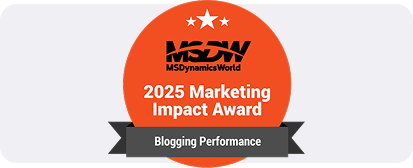Best CRM for Ecommerce in Canada | 2025
According to Hostinger, 2.71 billion people were shopping online in September 2024, and it is estimated that number will rise to 2.77 billion by 2025. In addition to this, increasing user penetration has also led to last-minute purchases.
Thus, it is essential for Ecommerce businesses to have the right CRM for ecommerce to provide a seamless shopping experience, manage customer interaction, and enhance loyalty. To keep this in mind, our consultant has conducted thorough research and presented 7 solutions to manage your sales pipeline, deliver personalized marketing, and improve customer support.
This blog will present the best ecommerce CRM, the benefits of using them, and which is the best CRM solution.
Top Ecommerce CRM Software for Business
Our expert consultant has done thorough research based on what you can do with each solution. Here are them:
1. Dynamics CRM

Dynamics CRM, part of the Dynamics 365 suite, is a robust solution having the capabilities to support ecommerce businesses. It offers powerful integration capabilities and AI-driven analytics, which help businesses to manage their complex operations, large customer bases, and dynamic sales processes.
What You Can Do with Dynamics CRM:
➤ Gain a 360-degree view of your customers.
➤ Automate workflows for efficient order and customer management.
➤ Leverage AI insights to personalize customer experiences.
➤ Seamlessly integrate with platforms like Shopify and WooCommerce.
➤ Automate customer outreach and marketing campaigns.
➤ Streamline order management and post-purchase customer support.
Why Businesses Love Dynamics CRM:
Businesses prefer Dynamics CRM due to its versatility, deep integration with other Microsoft tools, and ability to provide a unified customer view. You can choose the solution, irrespective of your business size.
Key Features:
- AI-driven insights for predictive analytics.
- Multi-channel customer engagement.
- Robust integration capabilities.
- Advanced reporting and dashboards.
2. OrderCircle

OrderCircle is a B2B-focused solution designed specifically for ecommerce businesses that manage wholesale and bulk orders. It simplifies inventory and order management processes. Businesses focusing on wholesale business can use this solution to streamline inventory and order management.
However, it provides limited functionality for B2C business compared to other ecommerce CRM solutions. Even OrderCircle lacks advanced marketing automation features.
What You Can Do with OrderCircle:
➤ Manage wholesale orders effortlessly.
➤ Offer a self-service portal for wholesale clients.
➤ Create self-service portals for wholesale customers.
➤ Track bulk orders and manage invoices efficiently.
➤ Automate inventory updates and synchronization across platforms.
Key Features:
- Self-service wholesale portal.
- Real-time inventory management.
- Order tracking and invoicing.
- Integration with Shopify and QuickBooks.
3. Nutshell

Nutshell is a user-friendly CRM that helps SMBs to manage their sales pipelines, track leads, organize contacts, and close deals more efficiently. This can be well-suited for you if you deal with modest sales pipelines.
However, it lacks advanced functionality for larger businesses and offers limited scalability for enterprise-level requirements.
What You Can Do with Nutshell:
➤ Track sales leads and customer interactions.
➤ Automate marketing campaigns.
➤ Gain insights with sales and performance reporting.
➤ Organize customer data and streamline follow-ups.
➤ Automate marketing efforts for email and social campaigns.
➤ Generate detailed reports to track sales performance.
Key Features:
- Sales pipeline management.
- Marketing automation.
- Customizable reporting.
- Integration with ecommerce tools like Shopify.
- Customizable Dashboards
4. Pipedrive
.jpg)
Pipedrive is designed to keep sales in mind to help e-commerce businesses optimize their sales pipelines and improve deal management. In addition to this, it offers an intuitive interface and automation tools, which allow you to use the solution in an efficient way.
However, Pipedrive offers limited customization options, and its reporting capabilities are also limited compared to other CRMs. This solution might not be ideal if you have complex business operations.
What You Can Do with Pipedrive:
➤ Monitor sales performance through customizable dashboards.
➤ Visualize sales pipelines for better deal tracking.
➤ Automate repetitive tasks like follow-ups and reminders.
➤ Gain insights with detailed sales reports and forecasting tools.
Key Features:
- Sales pipeline visualization.
- AI-powered sales recommendations.
- Workflow automation.
- Integration with tools like Zapier and Trello.
- Customizable workflows.
5. Salesforce

Salesforce is one of the renowned CRM solutions available in the market. It helps you manage customer relationships, sales, and marketing along with extensive customization and integration options.
However, it is the most expensive CRM solution present in the market, and small businesses can find it expensive. In addition to this, you require technical expertise to set up the application.
What You Can Do with Salesforce:
➤ Manage customer interactions across multiple channels.
➤ Leverage AI-driven insights for decision-making.
➤ Personalize customer journeys with detailed segmentation.
➤ Manage multi-channel marketing campaigns.
➤ Leverage robust third-party integrations to extend functionality.
Key Features:
- Advanced AI analytics with Einstein AI.
- Multi-channel customer engagement.
- Extensive third-party integrations.
- Scalable for businesses of all sizes.
- Customize customer journeys.
6. Podium Webchat

Podium Webchat is a customer communication-focused CRM tool designed to help ecommerce businesses connect with customers in real-time. It enables communication through web chat and messaging, helping you improve engagement.
However, it lacks CRM capabilities beyond messaging. You are required to integrate with other solutions for comprehensive featuring, resulting in increased expense.
What You Can Do with Podium Webchat:
➤ Communicate with customers in real time.
➤ Convert website visitors into leads.
➤ Engage customers via live chat to improve conversions.
➤ Collect reviews and feedback directly from customers.
➤ Automate messaging campaigns across multiple channels.
Key Features:
- Real-time web chat.
- Feedback collection and review management.
- Messaging integration with social platforms.
7. Freshsales

Freshsales is a cost-effective CRM solution for small and medium-sized ecommerce businesses. Many businesses choose this solution for its simplicity and robust automation features.
What You Can Do with Freshsales:
➤ Track customer interactions and behavior.
➤ Manage deals and sales pipelines.
➤ Score leads using AI-powered tools.
➤ Automate email and SMS campaigns.
➤ Track customer behavior for improved targeting.
Key Features:
- Email and SMS automation
- AI-powered lead scoring.
- Multi-channel customer engagement.
- Workflow automation.
- Integration with platforms like WooCommerce.
Benefits of Choosing the Right CRM
There are multiple benefits of CRM for ecommerce, such as better inventory planning, increased sales team performance, and improved customer experience. Let’s explore the benefits in detail:
Better Sales Team Performance: Using the best CRM for ecommerce helps you automate repetitive tasks. This empowers your sales team to focus on customer engagement and closing deals.
Enhanced Customer Experience: CRM for ecommerce business allows you to personalize interactions and provide faster responses to build customer loyalty.
Improved Inventory Planning: You can leverage sales insights from the best CRM for small ecommerce businesses to optimize stock levels and reduce wastage.
Cost Reduction: The CRM solutions enable you to eliminate manual errors and streamline operations to lower operational costs.
Stronger Email Marketing: You can segment the user base and automate the marketing campaign to deliver targeted campaigns with higher ROI.
Boost Marketing Effectiveness: The CRM for ecommerce empowers you to leverage data to create impactful promotions and offers.
5 Essential Features You Should Look for in a CRM Solution for Your Ecommerce Business
While searching for the best CRM for ecommerce business, you should carefully look for the features that allow your business to thrive. Let’s check the features.
Order and Transaction History
The best CRM for ecommerce offers you a centralized purchase history feature, which helps you track and analyze customer buying behavior. This aids you in understanding which products are popular. You can send targeted promotions based on past purchases and predict demand more accurately.
Customer Segmentation
Using the best CRM for ecommerce business empowers you divide your customer base into distinct groups based on various criteria such as demographics, purchase history, and behavior. This helps you create personalized campaigns for different segments. You can offer relevant products and services to specific groups. This can lead to higher conversion rates.
Platform Integration
Make sure the CRM for your ecommerce business provides you with seamless integration with your ecommerce platform for smooth operations. This feature syncs customer data, orders, and inventory across platforms. You can automate workflows and provide consistent service across all touchpoints.
Cart Abandonment Tracking
You can recover lost sales by identifying customers who leave items in their cart without completing the purchase. This feature allows you to remind customers about their abandoned carts. Using this feature, you can provide discounts or free shipping to encourage purchase completion. In addition, you can analyze reasons for abandonment.
Customer Support Tools
Efficient customer support is vital for maintaining customer satisfaction. CRM solutions with robust support tools offer ticketing systems, live chat, and knowledge bases.
Choosing the Right CRM
When selecting a Ecommerce CRM for your business, you should consider various factors, such as business size, budget, required features, and scalability. After evaluation of each option, you can go for a compatible CRM solution that can align with your long-terms needs.
For instance, if you deal with omnichannel selling, inventory management complexity, identifying sales trends, customer behavior patterns, and increased sales volume, Dynamics 365 CRM can be an ideal fit.
How Can Dynamics Square Help?
Dynamics Square is a leading Microsoft Dynamics Partner in Vancouver with 14+ years of experience helping businesses to tailor ecommerce CRM solutions. We have successfully delivered the solution with a 99% success rate across the industries. Our experts ensure successful implementation, customization, and integration with existing ecommerce platforms.
Call our expert at +1 778 381 5388 or write us an email at info@dynamicssquare.ca to implement the best CRM for ecommerce.
Frequently Asked Questions
What is CRM for ecommerce?
A CRM system for ecommerce helps businesses manage customer interactions and data throughout the customer lifecycle. It centralizes customer information, tracks sales, and supports marketing efforts, enabling personalized communication and improved customer service.
What are the 5 types of CRM?
There are five types of CRM systems available in the market, and you can choose the right solution for your business. Here is the list of CRMs; so, choose the ideal solution according to your need.
Operational CRM: This type of CRM eases your operation by streamlining the business processes.
Analytical CRM: This CRM helps you analyze customer data to get actionable insights.
Collaborative CRM: Using this solution, you can enhance communication across departments.
Campaign Management CRM: This CRM allows you to manage marketing campaigns to tailor customer interaction.
Strategic CRM: Using the CRM solution, you can focus on long-term customer relationships.
How to implement CRM in eCommerce?
To ensure successful CRM implementation for your ecommerce business, you need to follow these steps:
➤ Identifying business needs.
➤ Choosing the right CRM, like Dynamics CRM.
➤ If necessary, integrate with existing systems.
➤ Connect with Microsoft Gold Partner to train your staff.
➤ Monitor and optimize the system based on feedback and performance.
How do I Integrate my CRM to my existing solution?
If you want to integrate CRM with your existing solutions, there are three ways you can follow.
Using API Connector
You need to develop an API connector to ensure seamless integration. However, you must have the technical expertise to develop an API connector. Thus, a Solutions Partner, like Dynamics Square, can play a crucial role.
Using In-built Connector
Most CRM offers in-built connectors, which allow you to connect the CRM solutions with the existing one in single click. For instance, if you are using the Dynamics ecosystem, you can access 1000+ in-built connectors to connect various applications.
Using Third-Pary Solutions
This is the third option, which allows you to connect your CRM with the existing solution without any technical expertise or in case of no in-built connector.



